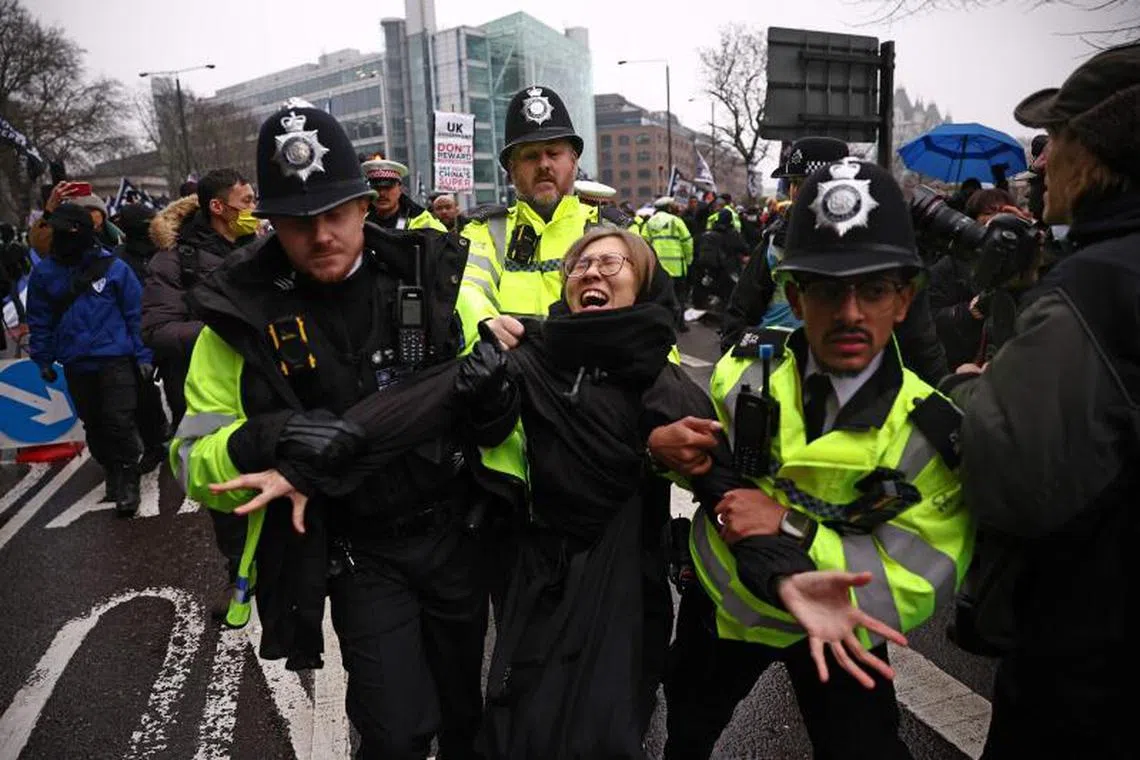Hundreds protest in London against Chinese ‘mega embassy’
Sign up now: Get ST's newsletters delivered to your inbox

Police officers take away a protester who was attempting to block the road during the protest on Feb 8.
PHOTO: AFP
LONDON - Hundreds of demonstrators on Feb 8 protested at a site earmarked for Beijing’s controversial new embassy
The new embassy – if approved by the UK government – would be the “biggest Chinese embassy in Europe”, one lawmaker said earlier.
Protester Iona Boswell, a 40-year-old social worker, told AFP said there was “no need for a mega embassy here” and that she believed it would be used to facilitate the “harassment of dissidents”.
China has for several years been trying to relocate its embassy, currently in the British capital’s upmarket Marylebone district, to the sprawling historic site in the shadow of the Tower of London.
The move has sparked fierce opposition from nearby residents, rights groups, critics of China’s ruling Communist Party and others.
“This is about the future of our freedom, not just the site of a Chinese embassy in London,” Conservative Party lawmaker Tom Tugendhat told AFP at the protest, adding that people living in the UK “sadly have been too often been threatened by Chinese state agents”.
“I think it would be a threat to all of us because we would see an increase in economic espionage... and an increase in the silencing of opponents of the Chinese Communist Party (in the UK),” the former security minister added.
Housing the Royal Mint – the official maker of British coins – for nearly two centuries, the site was earlier home to a 1348-built Cistercian abbey but is currently derelict.
Beijing bought it for a reported US$327 million (S$443 million) in 2018.

China has for years been trying to relocate its embassy to the sprawling historic site of the former Royal Mint in London.
PHOTO: AFP
Online surveillance
The protest comes as British Prime Minister Keir Starmer, elected last July, wants more engagement with Beijing, following years of deteriorating relations over various issues, in particular China’s rights crackdown in Hong Kong.
In November, Mr Starmer became the first UK prime minister since 2018 to meet Chinese President Xi Jinping, when the pair held talks at the G-20 in Brazil.
A national planning inspector will now hold a public inquiry into the scheme, but Communities Secretary Angela Rayner will make the final decision.
That has alarmed opponents who fear the Labour government’s emphasis on economic growth, and improved China ties, could trump other considerations.
Multiple Western nations accuse Beijing of using espionage to gather technological information.
They have also accused hacking groups backed by China of a global campaign of online surveillance targeting critics.
The United States, Britain and New Zealand in March 2024 accused Beijing-backed hackers of being behind a series of attacks against lawmakers and key democratic institutions – allegations that prompted angry Chinese denials. AFP


